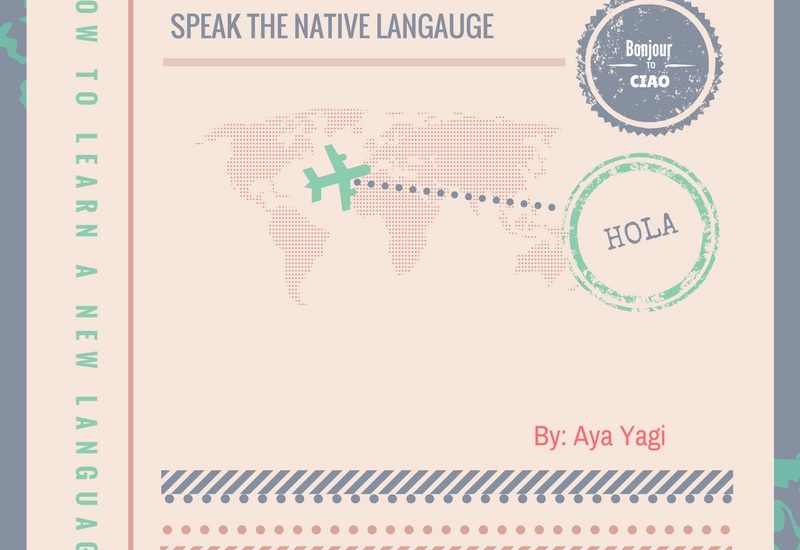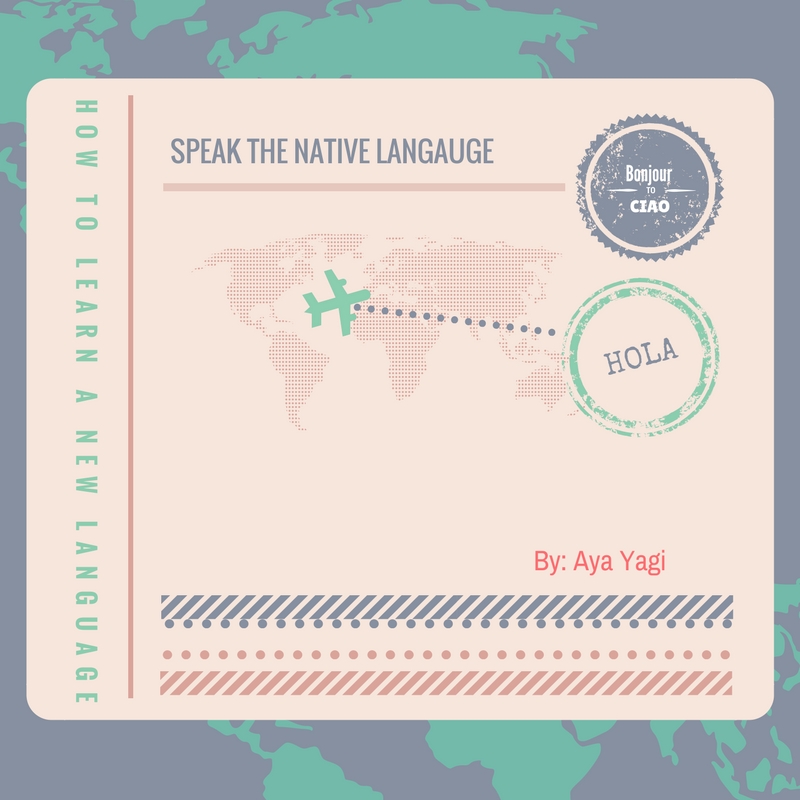How To Speak Another Language By: Aya Yagi


Bonjour readers, I’m back with more tips and tricks! Today, instead of travel recommendations, I thought I’d share my tips on how to feel comfortable speaking different languages. I grew up speaking Japanese at home and have been speaking/learning French since high school. My French accent isn’t perfect but it’s good enough that others ask me how I do it, and native speakers can’t tell I’m American (though that might be because I’m Asian… but that’s another story). I also do my best to try to speak at least a few phrases whenever traveling in a different country. As someone who feels comfortable speaking and trying out different languages, I’ve always enjoyed sharing my tricks with people, in hopes that they too might feel comfortable trying out a different tongue!
First, some tips for those who’ve been learning the language (on your own or in school), but just don’t feel confident:
- Mindset. A large part of speaking a different language is a strong mindset. Know that you’ll be making mistakes, but also know that mistakes are totally okay and normal! If you worry about making mistakes, you’re not going to get anywhere with speaking a language. “Fake it till you make it” is a motto that will serve you well when speaking a language.
- It’s okay if people laugh at your pronunciation. Who cares? Just laugh with them! It’s a learning experience; sometimes you might say words that are completely (and hilariously) wrong! It’s totally okay, and it makes for good stories later 😉
- Pronunciation Rules. Languages have rules. I know it’s a pain to learn them (grammar is not my favorite), but knowing the basic rules of how to pronounce and read words in your target language is crucial. What if you’re lost in the middle of nowhere? Even if you know how to call a taxi, you’re going to have to be able to tell them where exactly you are. And that might require some reading/pronouncing!
- Listening. For me, listening has been a huge part in learning a language. Listen to how native speakers say different words and phrases. Music/YouTube is an especially useful tool because you’ll find yourself singing along and sounding out words even when you don’t know what they mean! It’s about getting the rhythm of the language, even before you fully understand it. It’s also good to listen to news clips online and watch movies (turn on the language subtitles if you want to also see the words on a screen).
- Extra tip: Some people hate to do this, but I think it’s fun. Record yourself saying a few phrases (on your phone, your computer, or anything else) and play it back! What do you sound like? Does it sound okay? What sounds funny, what can you fix?
- Practice! Practice! Did I mention, practice?! Practice does make perfect. You probably know this, but maybe you don’t want to believe it. Good news, though, even with one day’s worth of X language under your belt, you can practice! Did you just learn numbers? Try saying them out loud and in your head whenever you’re eating, buying or reading figures. For example, you want to buy two apples today – that’s Deux Pommes. It’s okay if you don’t know the fruit name yet, baby steps!
- Talk to yourself. I mean this quite literally. Whether you’re in your room, out on the street, driving your car, try saying phrases to yourself and even having conversations with yourself! This is the perfect way to practice, once you get used to the slightly awkward nature of it.
- Learn “filler words” in your target language. I know, when you’re learning a language you still feel the need to say “um” or “like” in English. To combat this, even slightly, see if you can find out the equivalent words and use them instead (ex: “fin” and “euh” in French). You won’t be saying anything important, but do whatever you can to not break your language streak!
- Go for it! If you’ve been studying the language for a while, chances are you know a lot more than you realize. You have a word bank in your head, and you know the basic structure of sentences. Try not to worry too much and jump into conversation! Obviously, this is easier if you’re located in another country, but see if you can visit a café, supermarket or restaurant where they have speakers of your language. Try out your skills! If they don’t understand at first, you can always mention that you’re trying to learn the language and would love to practice!
For those who don’t know a language and need to learn survival phrases when traveling:
- Mindset. A lot of the mindset and stuff like that is the same as for those who’ve been studying the language. Just have confidence in yourself – a language is just a way for humans to communicate with each other. Hand gestures can always assist your words, and in the end you’re only trying to get across a message!
- Know the basics. Greetings (hello, goodbye) go a long way as does politeness (thank you, please, etc). Knowing how to ask questions, “Could I please have ____” “Where is____?” “What is _______?” are always good. While hopefully you’ll be speaking a different language, “Do you speak English??” is also a good question to know how to ask.
- Repeat these basics to yourself both in your head and out loud. Make sure that at least some of it is automatic!
- Taxi and transportation basics can be absolutely crucial. I’m so glad that I took the time to memorize a few sentences of German when traveling a few years ago. My friend and I got off at the wrong stop, in a very small town near the French border, and it was pitch black and silent outside. Our only hope was calling a taxi to come help us travel the few kilometers back to our hotel!
- If the language you’re trying to learn is widely spoken, chances are some wonderful YouTuber has come up with some lovely, simple video lessons. Watch them! Repeat after them!
- Don’t be afraid to try your phrases! You might fail hilariously but it will make for good storytelling later. (Example: I think I scared a nice woman on the street in Taipei when all I was trying to say was “Excuse me, where’s the metro?” Who knows what I actually asked….)



